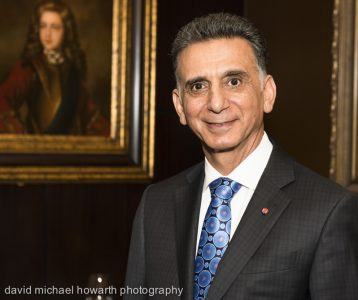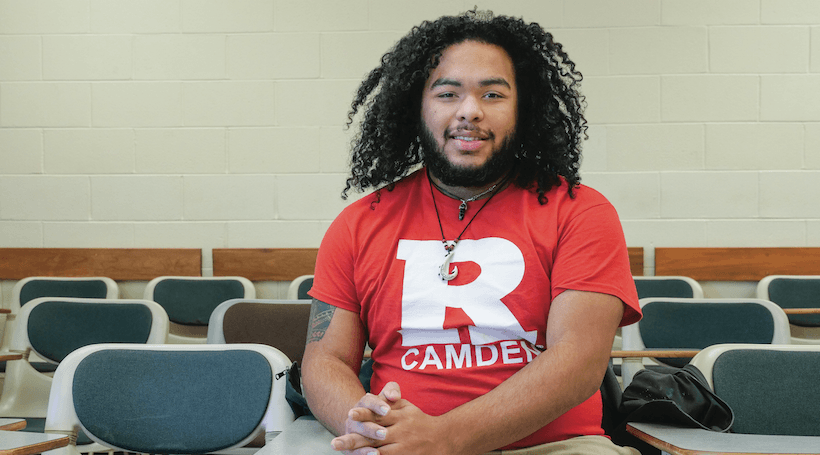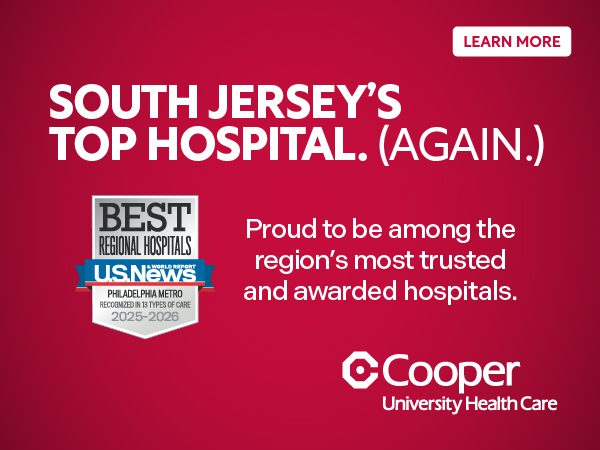Rashone Price graduated last year from the second-smallest public high school in New Jersey. With just over 300 students, Salem High School had a graduation rate of 73 percent between 2010 and 2015, well below the state average of 87 percent. In 2015, only 11 percent of students at Salem took the SAT or ACT.
“Where I’m from, not many people pursue education after high school,” Price says. “There’s not a lot of college prep. The teachers try their best, but it’s mostly about getting students ready for the workforce.”
Price’s mother didn’t attend college, nor did his three older siblings. But the 19-year-old, today a freshman computer science major at Rutgers University-Camden, says his goal was always to pursue a degree.
“I was the first in my family in a long time to make it past high school,” he says. “There is a lot of pressure, because everyone back home is looking at me to do the very best I can, while I’m still figuring things out myself.”
Price enrolled at Rutgers through the New Jersey Educational Opportunity Fund (EOF), a program Marsha Besong, assistant chancellor for Rutgers-Camden’s EOF office, says started in the late ’60s as a result of the civil rights movement.
“It’s about making sure all students have access and opportunity for higher education,” Besong says. “Most access programs provide support services but not financial aid. New Jersey does something spectacular in providing up to $1,400 annually, which helps purchase books and cover some costs.”
As part of Rutgers-Camden’s EOF program, every fall, 60 first-generation freshmen arrive on campus five weeks early. Living in university housing, taking classes on campus and participating in social programs helps the students acclimate to the college experience.
“We spend three days talking about study skills, time management, team building and communication,” Besong says. “Then they start their classes. Depending on what they come in with, they can earn up to seven credits during those five weeks. They learn the basics: this is how you register, get your parking, use your meal plan and swipe your student ID to pay for things. They get to know each other and older EOF students. It allows them to develop an extended network that most students don’t have when they arrive on campus in the fall.”
University spokesman Mike Sepanic says Rutgers-Camden has always been a campus of first-generation students.
“For so many families in South Jersey, our campus is the way to a Rutgers degree,” he says. “It’s always been a place of access. In the fall of 2017, 62.6 percent of all undergraduates were first-generation, meaning their parent did not have a bachelor’s degree.”
For many of those families, Sepanic says, the biggest hurdle is a financial one: a large number of Rutgers-Camden’s students come from lower-income households, and navigating the financial aid process can include a steep learning curve.
“Financial aid can be difficult if you’re not used to dealing with it,” he says. “It’s like the first time you buy a house or a car; there’s a lot of details, and you’re just trying to keep up.”
To ease the burden, the university launched a program in 2015 called Bridging the Gap, which covers the remainder of tuition after federal grants and state assistance for students below certain income thresholds.
“Between federal Pell Grants and New Jersey tuition assistance, they’re coming with a chunk of money already,” Sepanic says. “If we want to make sure they have access to a Rutgers education, all we have to do is bridge the gap. The hope is that once we remove the student debt burden, a couple of things happen. The biggest is that students won’t need to work 40 hours a week. They should be able to spend more time studying, engaging in learning experiences, accepting internships and studying abroad. These are things that improve you as a person, a student and a potential employee.”
At Rowan University, faculty and staff recently formed a first-generation task force and launched a program called Flying First. Penny McPherson Myers, associate vice president for diversity and organizational effectiveness at Rowan and a co-chair of the committee, says financing college is a big challenge, but it’s far from the only one facing first-generation students.
“People think that if you provide money, it solves problems, but these students might not need financial aid. No matter what, they need a lot more than money,” she says. “First-generation students – and their parents – are at a serious disadvantage. They’re simply not familiar with the rules of the game. They’re lacking in that social capital, and completing a financial aid package or even just the Common App can be so discouraging for them.”
One of the task force’s early initiatives has been to change the way college is talked about on the Rowan Campus.
“If you didn’t go to college, there’s a whole language you don’t speak,” Myers says. “Someone says, ‘Take the money to the bursar,’ and a student who’s never heard of a bursar finds that daunting. What does matriculation mean? What’s a provost? The jargon of higher education alone can be discouraging.”
To solve the problem, Myers and her colleagues have begun holding a session for students and parents at freshman orientation specifically to talk about the glossary of terms.
“We’re trying to change the way we talk on campus,” she says. “Instead of just saying, ‘the bursar,’ we want our faculty and staff to say, ‘The bursar’s office, the office responsible for billing and fees.’ One of the biggest challenges first-generation students and their parents have is that they don’t know what they don’t know. And who wants to be outed as not knowing? We don’t want to raise our hand and say, ‘I don’t know what that is.’”
“So this is about two things: making safe environments where students don’t feel uncomfortable letting people know what they don’t know and changing the way we talk so that it doesn’t happen at all. It’s a small adjustment, but it lets these students know we see them and lets their parents feel just as comfortable as the person who has two or three degrees sitting next to them.”
In 2017, Rowan’s task force hosted a symposium that included faculty, staff, students and alumni speaking on a panel about their experiences.
“The students talked about the pressure to succeed and the difficulty in having no idea what to ask for from their families and support systems,” Myers says. “Parents may not understand the amount of time their children need to spend on campus or the importance of social activities. The students are trying to educate their parents so the parents can support them.”
Another major theme of the panel, Myers says, was the resiliency of first-generation students.
“They have many strengths,” she says. “They have a lot of hope about their future and the opportunity they have. They persevere through a lot: needing to maybe work many hours on top of attending school, figuring things out on their own. When we asked the students, ‘What do you want people to know about first-generation students?’ one student said, ‘That we never give up.’”
Rashone Price’s family is proud of what their son is accomplishing, and he is invested in making sure that while he may be the first, he won’t be the last.
“In high school, I was a part of the wrestling team, the football team and the track team,” he says. “I go back as often as I can to see their games and matches, and I talk to the students who are younger than me. They talk to me about trying to get into college, and I’m helping them as much as I possibly can. There are so many people in my hometown who just want to do better, and if I can help them do it, it will have a positive impact on the whole town.”

Rowan’s Dr. Ali Houshmand
From Poverty to Presidency
Growing up in Tehran in the 1960s, Rowan University President Ali Houshmand was so poor he couldn’t afford shoes, and he almost never knew where his next meal would come from. Today, he is the president of a university growing rapidly in both size and reputation, and the challenges facing first-generation college students is an issue that remains close to his heart.
“It is fundamentally important to me, because I ask myself, ‘What would I be today if I did not have the opportunity for education?’” Houshmand says. “Of course I was ambitious and determined, but it was education that opened my eyes and showed me that if you are willing to work and you’re creative and have the right tools, you can become anyone you want. I want every kid who’s had experiences like mine to also have the opportunities I did.”
Houshmand says that while there are many hurdles for first-generation students, the biggest may simply be imagining college as a possibility.
“I grew up in a place where it was too dangerous to go out after dark,” he says. “My struggle in those days was about where I’d find my next meal and if I could find a pair of shoes so I could play soccer. When a situation is that dire, you don’t have time to think beyond the next day.”
Houshmand often speaks about how his enrollment at elite schools altered his life trajectory. He wants to be clear that the hardships he overcame are still very real for a huge number of young people in New Jersey and throughout the world.
“These are important issues,” he says. “We have to recognize that as great as this country is and as far as our world has come, there are kids who could benefit from our help.”














